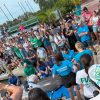A group of Eckerd College students leaves tonight for a 10-day research trip into the Gulf of Mexico as part of an ongoing study of the impact of the BP Oil disaster.
The six students — Chelsea Kuhs ‘15, Rachael Kalin ‘15, Caroline Glenn ‘16, Blake Borgeson ‘14, Josie Hadfield ‘15, and Gipson Hawn ‘15 — work with Eckerd Marine Science Professor Gregg Brooks, Ph.D. They will be working aboard the RV Weatherbird II under the supervision of Stan Locker, Ph.D., a research scientist of marine geology and geophysics at the University of South Florida College of Marine Science.
They will be joined by Eckerd alumni Trevor Browning ‘11 and Cathryn Wheaton ‘14, who work for the USGS, and students from Valdosta State University and Florida State University. The research is funded by the Deep-C Consortium, which is studying the geomorphologic, hydrologic and biogeochemical settings influencing the distribution and fate of the oil and dispersants released during the Deepwater Horizon disaster.
“This is a wonderful opportunity for our students and almost unheard of for undergraduates,’’ said Brooks. “Anytime they can get experience on a real research cruise, that’s unbelievable.”
The students will help map the seafloor of the gulf off the coast of Panama City, Fla., to create a baseline of information about the topography and habitat of that area of the gulf, Locker said. The results will inform future research. “It’s important to know what resources are out there to be protected,’’ Locker explained. “There is a broad application of this research.”
This is not the first time Eckerd students have collaborated with Locker. “Eckerd students have always been very helpful over the years,’’ he said. “They always do really well.”
The students will blog about their experiences each day. Follow along on their journey of discovery.












